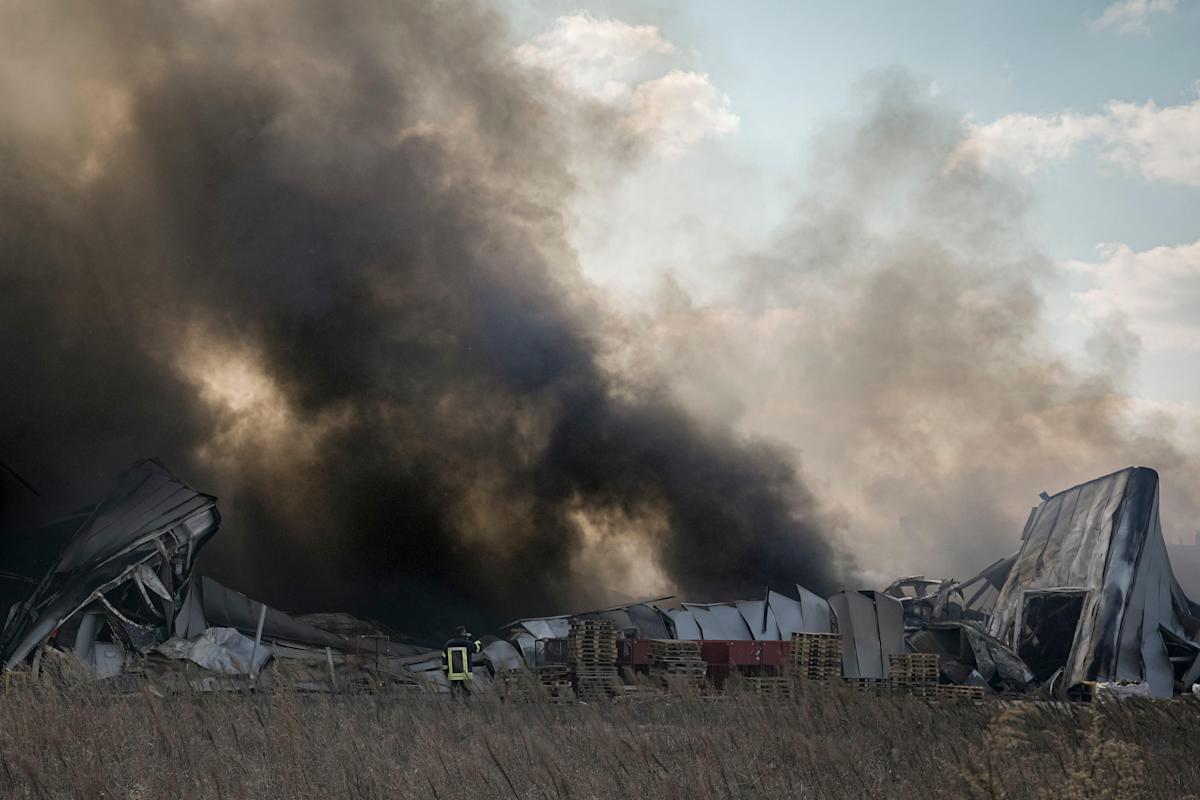
Vladimir Putin has embarked on the path he always wanted: restoration of the Soviet Union. He said the collapse of the USSR was the greatest geopolitical mistake of the 20th century.
Since becoming president, he has inherited imperial power of every Russian and Soviet dictator expansion, violence and suppression. An adviser to the czar said: “If Russia does not expand, it will rot.” Stalin built on that, freely exterminating peoples wherever he felt it necessary, and the Ukrainians bore the brunt of this, as was nearly 7 million Ukrainians were killed in collectivization and starvation in the 1930s. Stalin became the world’s first “nation-killers,” as the sovereignty of states, international affairs governed by rules and diplomacy, and humanitarian aims were swept aside.
We are witnessing a replay of this as Putin is content to have Russian troops fire on women and children under the Red Cross. Ukrainians have no choice but to resist, and the West cannot tolerate genocide. From the darkest corners of the continent came the phrase “never again.”
Western international relations seek a balance of powers among the “great” powers, and almost everything is done not to disturb the sphere of influence surrounding Great Powers. But since the Second World War, there were clear limits placed on what could not be done: the inviolability of non-combatants, non-use of nuclear weapons, recognition of Red Cross or even the white flag, were agreed to by all parties.
With nuclear reactors now at play (whose radiation will spread through the West), it is not clear this holds for nuclear weapons. The slaughter of innocents — Putin is showing us he revels in it. Moreover, Europe over the past two centuries shows that great powers come and go, meaning the balance of power is purely a temporary resting point in international politics — something the Soviet Union/Russia has exploited. If this behavior is not resisted and the cause removed, everything that has been achieved will be lost.
Another problem, which Stalin’s understood: a country’s power is more than a combination of military and economy as it carries its ideology wherever it goes. It’s what gave the Cold War its sharp edge: If we lose, the essence of our freedom and the ability to choose our path disappear. Against this, stood Marxism-Leninism espoused by the USSR. Now, however, Russia has no ideology to offer the world — it traffics solely in violence and brute force, attacking our very credo.
The recent events have revealed that Russia is not a “great” conventional power; we are, instead, witness to huge losses of men and material on the battlefront, the indiscriminate destruction of populations and housing, chilling statements that peoples “do not exist.” None of this should sit well with the West, which has heard and seen this behavior 80 years ago. But that does not mean Putin won’t pursue a bloody path toward a destructive end, as dictated by his imperial logic.
A complicating factor has been the West’s belief that the Russians were masters of strategy. But that covers over huge mistakes every decade or so in the foreign policy of the Soviet Union/Russia. Think back to the last czar who in 1914 thought he could declare a “partial mobilization” against Austria-Hungary, even though no such thing exists. The result was the First World War. In 1948 Stalin cut West Berlin off from any access to the West, not expecting a U.S. response. But Truman did respond, and we witnessed one of the frightful events of the Cold War as the two powers stood face to face for over a year before the Soviet dictator relented.
In 1962, Nikita Khrushchev attempted to place missiles on the island of Cuba, and we were once again facing nuclear war. In 1979 Leonid Brezhnev attempted to capitalize on the collapse of U.S. presence in Iran by invading Afghanistan. After 10 years of war, the Soviets withdrew as insurgents in armed United States Stingers defeated them. Even Mikhail Gorbachev, who thought a little political openness and economic perestroika could be restricted to the party soon found Soviet society engulfed in a desire for change, just in time for Chernobyl to blow up.
The “Gerasimov doctrine,” which guided Russia through the wars of the 21st century, has failed in Ukraine. While incorporating political, military, cyber, informational, diplomatic elements of power and exploiting the weakness of the West, it gave Putin gains earlier. It has key weaknesses that now are revealed. First, it rests upon having an outside world that willingly accepts the piecemeal division of states by Russia, which occurred in Georgia, and previously in Ukraine. Second, it relied upon a “fifth column” or substantial numbers of saboteurs within the subject country. Both have failed miserably. Russia has been left without a political ideology and a usable military doctrine for its own security, a fact that may cause the leadership to think hard about their futures.
Finally, Russia has always been an empire, not a state, and empires operate by a different logic than states. Lenin understood that in a position of weakness, one accepts the world as is until you acquire the position and power to change the direction of history. The balance-of-power theory has never grasped that Russian foreign policy has always been driven by the dynamics of empires and energized by communist control. Lenin understood the need to retreat when needed, hence the amazing Brest-Litovsk Treaty (1917) that actually gave the Ukraine and Belarus to Prussia, to preserve what he had already achieved through Russian Revolution.
Clearly, Lenin was operating at a much higher strategic level than the mere balance of power — this was never the endpoint of politics but a temporary resting point in the progress of history. In short, he was right, as the Armistice returned to the empire all its territories with nary a complaint from the West. In the medium term, he was also correct as the world was subject to 75 years of communism. Now Putin wants it back and is destroying everything to do so. After the First World War, we let the opportunity to define a better world for us slip into the hands of dictators. We cannot let that happen again.
Putin’s goals have always been the same: reduce the presence of the United States and Europe and split those powers on the continent into a collection of squabbling states. This has been greatly helped by his ability to insert the divisiveness within states, undermining unity. Under President Donald Trump, this seems almost within reach as we had an American president give up on NATO and Western intelligence and stake everything on Putin. But as the fighting goes on in Ukraine, frightening claims are put forward: Putin is claiming that “Ukraine does not exist” using the language of the Nazis. Language like that has not been heard in Europe since the time Adolf Hitler spoke them.
Should his effort in Ukraine succeed the path will be open to moving further. Belarus is already in his grasp, and Moldova will easily fall after which he can turn to the north. He wants a land bridge from Kaliningrad to Belarus and possibly the Baltic states. How can this even be a dream? Because in his world there is no respect for state boundaries, ethnic groups or treaties negotiated with the West. All that matters is to carefully watch the international sphere and see when one can act to expand. Unfortunately, we have Trump to thank for this because it was under his watch that the NATO alliance was weakened and America was consumed with its own internal problems.
What can the United States and its allies do now? Militarily they need to supply Ukraine with the maximal amount of assistance without endangering NATO allies. This includes sending the military hardware, especially that which can slow down the air assault and the tanks the Russians sent over. This includes Stinger missiles, javelins, drones that can be operated from within Ukraine, and planes as well. Greece, Cyprus and Bulgaria have offered S300 missiles and a humanitarian corridor — the right over every sovereign state to request — must be pushed forward. We ought to push China hard, not simply through economics, but by reminding them that their snatching of Tibet need not be tolerated.
In diplomacy elsewhere, the United States needs to continue supporting the government of President Volodymyr Zelenskyy, and NATO should consider the admission of Sweden and Finland. Finally, do not let the Russian dictator define the terms: “Sanctions” are not acts of war; Chechen (and Syrian?) fighters being sent constitutes terrorist actions; firing on civilians is a war crime.
Assemble all the data and evidence that genocide, killing of civilians and other war crimes and link them not only to Putin, but to the Kremlin. In economic terms, the seizure of property of oligarchs must deepen, and they should be reminded that support for Putin’s actions does not end with simple economic acts. Do not let oil oligarchs get off because we are dependent on their oil. There are various ways we can affect their lives and we use them all. In humanitarian policy, we cannot let the war criminal Putin always was get away with the slaughter of innocents. We must push forward with helping people get out of the country who want, to get medicine if needed and provide food.
We cannot sit still as history is opening a grisly opportunity to move toward freer, just, and more peaceful world. The last time this happened, we did not act, and Lenin took over the reins of history. The world has paid for it ever since. Our choice now has nothing to do with a balance of power; it is between a return to a brutal past or step into a better future.
Peter J. Stavrakis received his doctorate in political science in 1986. He taught at the University of Vermont and the National Defense University. He also served as deputy director of then-Kennan Institute of Advanced Russian Studies. Stavrakis is of Ukrainian-Greek heritage, and his parents lived through the 1930s and 1940s in Kyiv, Ukraine.
This article originally appeared on Delaware News Journal: Vladimir Putin: Russia’s new nation killers




